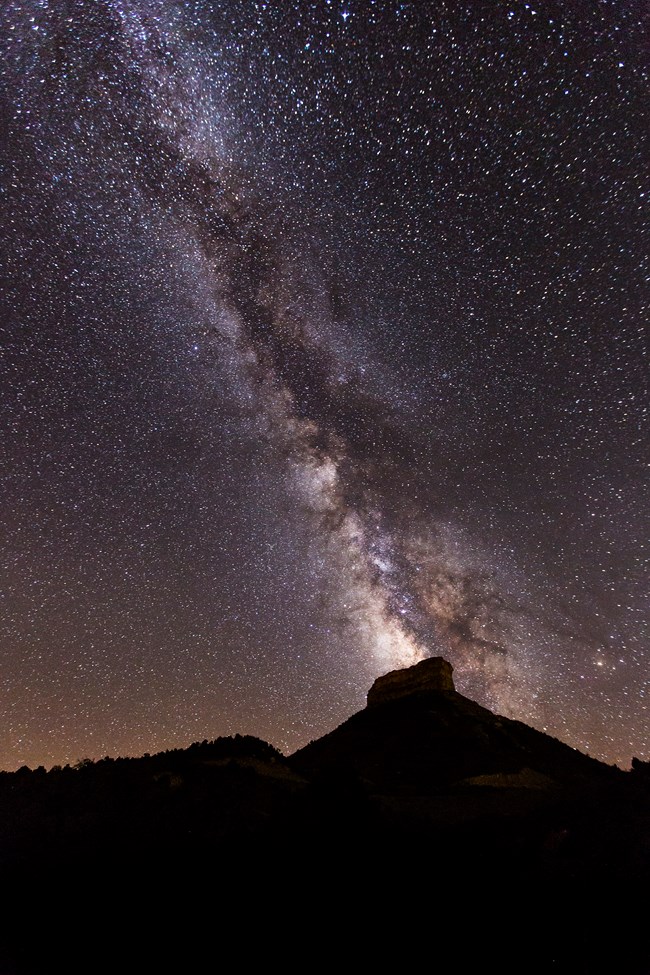
Jacob W. Frank
A whole new world comes alive at night and is waiting to be explored. When you head out at night to stargaze, take your family or friends with you, be prepared for current weather conditions, and let your eyes adjust to the wonder above. Here are some ideas to make your experience memorable:
At Home
-
Sleep in your backyard on a starlit night. Watch the stars and planets move across the night sky.
-
Use a red flashlight or headlamp. This will help you navigate at night without compromising your night vision!
- Can you see the stars as well in your backyard with the porch light on? Try using a amber or red light bulb color which is not as impactful on your night vision. Avoid use of white light. Turn outdoor lights off when viewing the night sky.
Around Town
-
From an open field or park, find the Big Dipper. The last two stars in the cup of the Big Dipper point to the North Star, which is just a bit dimmer than the individual stars in the Big Dipper.
-
Attend your local astronomy club's next public "star party." There you can find amateur astronomers sharing views through their telescopes.
- Next time you are riding in a car, look closely at the outdoor lights. Do some shine in your eyes more than others? Can you find a light that only shines downward? Learn more about night sky friendly lighting.
In the Wilderness
-
Look for the Milky Way stretching across the night sky. What looks like a faint cloud is actually the light from millions and millions of distant stars. The Milky Way is our home galaxy and is best seen in summer and fall evening skies. Also look for shooting stars (meteors) which can be seen throughout the year.
-
If the full moon is up, the Milky Way will be hard to see. Try going for a night hike instead! Let your eyes adjust to the moonlight and keep your headlamp turned off (but available for safety if needed).
In a National Park
-
Sleep under the stars. What better way to experience the great outdoors than sleeping under a star-filled sky?
-
National parks are great places to get to know nocturnal animals —wildlife that is awake at night and asleep during the day. Sit quietly and listen for these creatures.
- Many national parks offer night sky programs, from telescope astronomy events to full moon walks with rangers. Click on the collapsible panel below to see a partial list of parks that offer night sky programs. Check out our Night Sky Events page to find a stargazing opportunity near you.
An asterisk* denotes areas certified by Dark Sky International as an International Dark Sky Place.
Alaska
Denali National Park
Yukon-Charley Rivers National Preserve
Arizona
Chiricahua National Monument*
Grand Canyon National Park*
Grand Canyon-Parashant National Monument*
Organ Pipe Cactus National Monument
Petrified Forest National Park*
Pipe Spring National Monument*
Saguaro National Park
Sunset Crater National Monument*
Tonto National Monument*
Tumacácori National Historical Park*
Walnut Canyon National Monument*
Wupatki National Monument*
Arkansas
Buffalo National River*
California
Death Valley National Park*
Joshua Tree National Park*
Lassen Volcanic National Park
Colorado
Black Canyon of the Gunnison National Park*
Curecanti National Recreation Area*
Dinosaur National Monument*
Florissant Fossil Beds National Monument*
Great Sand Dunes National Park and Preserve*
Hovenweep National Monument*
Mesa Verde National Park*
Rocky Mountain National Park
Hawai'i
Haleakalā National Park
Hawai'i Volcanoes National Park
Idaho
Craters of the Moon National Monument*
Florida
Big Cypress National Preserve*
Kentucky
Mammoth Cave National Park*
Maine
Acadia National Park
Katahdin Woods and Waters National Monument*
Michigan
Sleeping Bear Dunes National Lakeshore
Minnesota
Voyageurs National Park*
Montana
Glacier National Park*
Nevada
Great Basin National Park*
New Mexico
Capulin Volcano NM*
Carlsbad Caverns National Park
Chaco Culture National Historical Park*
El Morro National Monument*
Fort Union National Monument*
Salinas Pueblo Missions NM*
Valles Caldera National Preserve*
North Carolina
Cape Lookout National Seashore*
South Dakota
Badlands National Park
Tennessee
Obed Wild and Scenic River*
Texas
Big Bend National Park*
Lyndon B. Johnson National Historical Park*
Utah
Arches National Park*
Bryce Canyon National Park*
Canyonlands National Park*
Capitol Reef National Park*
Cedar Breaks National Monument*
Dinosaur National Monument*
Natural Bridges National Monument*
Rainbow Bridge National Monument*
Timpanogos Cave National Monument*
Zion National Park*
Virginia
Shenandoah National Park
Washington
Olympic National Park
Last updated: July 24, 2025
